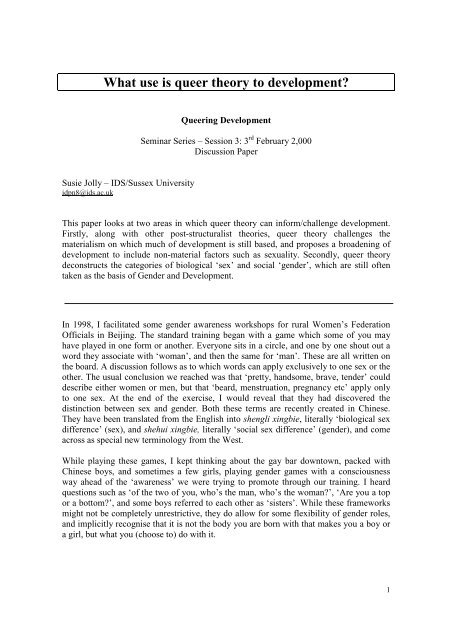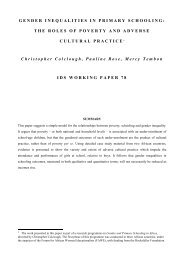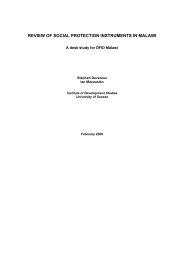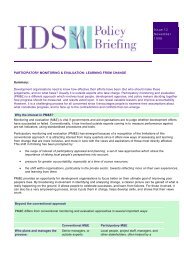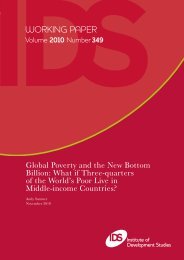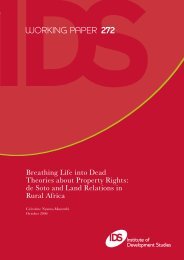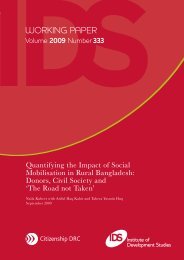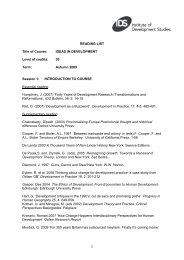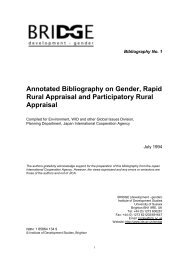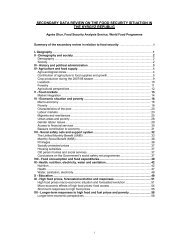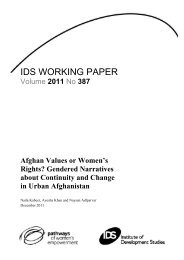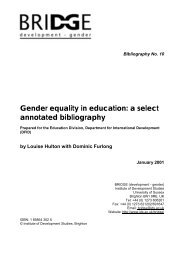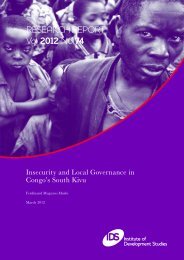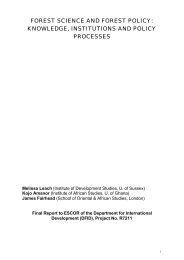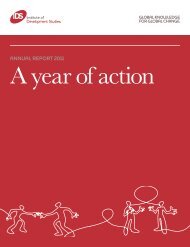What use is queer theory to development? - Institute of Development ...
What use is queer theory to development? - Institute of Development ...
What use is queer theory to development? - Institute of Development ...
Create successful ePaper yourself
Turn your PDF publications into a flip-book with our unique Google optimized e-Paper software.
<strong>What</strong> <strong>use</strong> <strong>is</strong> <strong>queer</strong> <strong>theory</strong> <strong>to</strong> <strong>development</strong>?<br />
Queering <strong>Development</strong><br />
Seminar Series – Session 3: 3 rd February 2,000<br />
D<strong>is</strong>cussion Paper<br />
Susie Jolly – IDS/Sussex University<br />
idpn8@ids.ac.uk<br />
Th<strong>is</strong> paper looks at two areas in which <strong>queer</strong> <strong>theory</strong> can inform/challenge <strong>development</strong>.<br />
Firstly, along with other post-structural<strong>is</strong>t theories, <strong>queer</strong> <strong>theory</strong> challenges the<br />
material<strong>is</strong>m on which much <strong>of</strong> <strong>development</strong> <strong>is</strong> still based, and proposes a broadening <strong>of</strong><br />
<strong>development</strong> <strong>to</strong> include non-material fac<strong>to</strong>rs such as sexuality. Secondly, <strong>queer</strong> <strong>theory</strong><br />
deconstructs the categories <strong>of</strong> biological ‘sex’ and social ‘gender’, which are still <strong>of</strong>ten<br />
taken as the bas<strong>is</strong> <strong>of</strong> Gender and <strong>Development</strong>.<br />
In 1998, I facilitated some gender awareness workshops for rural Women’s Federation<br />
Officials in Beijing. The standard training began with a game which some <strong>of</strong> you may<br />
have played in one form or another. Everyone sits in a circle, and one by one shout out a<br />
word they associate with ‘woman’, and then the same for ‘man’. These are all written on<br />
the board. A d<strong>is</strong>cussion follows as <strong>to</strong> which words can apply exclusively <strong>to</strong> one sex or the<br />
other. The usual conclusion we reached was that ‘pretty, handsome, brave, tender’ could<br />
describe either women or men, but that ‘beard, menstruation, pregnancy etc’ apply only<br />
<strong>to</strong> one sex. At the end <strong>of</strong> the exerc<strong>is</strong>e, I would reveal that they had d<strong>is</strong>covered the<br />
d<strong>is</strong>tinction between sex and gender. Both these terms are recently created in Chinese.<br />
They have been translated from the Engl<strong>is</strong>h in<strong>to</strong> shengli xingbie, literally ‘biological sex<br />
difference’ (sex), and shehui xingbie, literally ‘social sex difference’ (gender), and come<br />
across as special new terminology from the West.<br />
While playing these games, I kept thinking about the gay bar down<strong>to</strong>wn, packed with<br />
Chinese boys, and sometimes a few girls, playing gender games with a consciousness<br />
way ahead <strong>of</strong> the ‘awareness’ we were trying <strong>to</strong> promote through our training. I heard<br />
questions such as ‘<strong>of</strong> the two <strong>of</strong> you, who’s the man, who’s the woman?’, ‘Are you a <strong>to</strong>p<br />
or a bot<strong>to</strong>m?’, and some boys referred <strong>to</strong> each other as ‘s<strong>is</strong>ters’. While these frameworks<br />
might not be completely unrestrictive, they do allow for some flexibility <strong>of</strong> gender roles,<br />
and implicitly recogn<strong>is</strong>e that it <strong>is</strong> not the body you are born with that makes you a boy or<br />
a girl, but what you (choose <strong>to</strong>) do with it.<br />
1
I wondered how the understandings from the gay scene could be brought in<strong>to</strong> our gender<br />
training. It would not have been politically acceptable <strong>to</strong> hold an open meeting between<br />
rural Chinese government <strong>of</strong>ficials and cosmopolitan gay boys from Beijing, and in any<br />
case the culture clash might render the exerc<strong>is</strong>e counter-productive. However, there must<br />
be ways <strong>to</strong> start such communication, which could well be worthwhile. In fact, during the<br />
last year it seems there has been greater interaction between a few individuals in<br />
establ<strong>is</strong>hed positions relating <strong>to</strong> women’s <strong>is</strong>sues, (such as academics) and individual<br />
<strong>queer</strong> activ<strong>is</strong>ts, and I am sure th<strong>is</strong> will have an effect.<br />
Th<strong>is</strong> experience started me thinking about how Queer approaches could constructively<br />
inform <strong>development</strong> efforts, both on a theoretical and practical level. Today I focus on<br />
the theoretical, looking at how <strong>queer</strong> <strong>theory</strong> can contribute <strong>to</strong> <strong>development</strong>.<br />
1. Queer Theory<br />
The word ‘<strong>queer</strong>’, originally an insult for marginal<strong>is</strong>ed sexualities and other ‘deviants’,<br />
was in the late ‘80s reclaimed and invested with new meanings by activ<strong>is</strong>ts in America.<br />
Formerly, with the words ‘gay’, ‘lesbian’, ‘homosexual’, we had defined ourselves in<br />
relation <strong>to</strong> heterosexuality. ‘Queer’ constituted a rejection <strong>of</strong> the hetero-homo binary, and<br />
a conception <strong>of</strong> sexualities as non-essential, shifting and transitional, a post-structural<strong>is</strong>t<br />
understanding <strong>of</strong> sexual identities. Queer aimed <strong>to</strong> provide an approach open <strong>to</strong> all those<br />
oppressed by the hegemony <strong>of</strong> heterosexual norms – whether they themselves were gay,<br />
lesbian, b<strong>is</strong>exual, heterosexual, transgender, transexual, celibate, undecided, SM,<br />
hermaphrodite, androgynous etc. Th<strong>is</strong> new energy permeated in<strong>to</strong> academia, and a body<br />
<strong>of</strong> ‘<strong>queer</strong> <strong>theory</strong>’ emerged with thinkers such as Judith Butler, Eve Sedgwick, Leo<br />
Bersani, David Halperin, Johnathon Dollimore and Alan Sinfield. Queer <strong>theory</strong> has, for<br />
some, now moved beyond a necessary association with sexuality. Halperin, somewhat<br />
controversially, explains:<br />
<strong>queer</strong> <strong>is</strong> by definition whatever <strong>is</strong> at odds with the normal, the legitimate, the<br />
dominant. There <strong>is</strong> nothing in particular <strong>to</strong> which it necessarily refers. It <strong>is</strong> an<br />
identity without essence (David Halperin, cited in www.<strong>theory</strong>.uk)<br />
So <strong>queer</strong> has moved beyond challenging sexual norms, <strong>to</strong> present a broader challenge <strong>to</strong><br />
other norms. I believe <strong>queer</strong> <strong>theory</strong> can likew<strong>is</strong>e challenge <strong>development</strong> norms, in two<br />
ways in particular. Firstly, it presents a challenge <strong>to</strong> material<strong>is</strong>m. Secondly, it challenges<br />
the sex-gender div<strong>is</strong>ion on which much <strong>of</strong> Gender and <strong>Development</strong> <strong>is</strong> still based.<br />
2. Material<strong>is</strong>m<br />
Economics <strong>is</strong> a large part <strong>of</strong> <strong>development</strong> studies. The ‘progress’ and ‘success’ <strong>of</strong><br />
<strong>development</strong> has <strong>of</strong>ten been measured in terms <strong>of</strong> economic indica<strong>to</strong>rs such as GDP.<br />
Now, the limitations <strong>of</strong> such approaches are being recogn<strong>is</strong>ed and broader indica<strong>to</strong>rs<br />
based on ‘basic needs’, such as health, literacy etc. are being brought in<strong>to</strong> the picture. In<br />
2
some areas, such as IDS poverty work on poor people’s own perceptions <strong>of</strong> poverty, there<br />
has also been a recognition <strong>of</strong> the importance <strong>of</strong> non-material or ‘intangible’ fac<strong>to</strong>rs such<br />
as status, ‘face’, social <strong>is</strong>olation and social networks. Key features <strong>of</strong> ill-being, such as<br />
insecurity, identified by ‘poor’ people in such consultations, are concepts which cover<br />
both tangible and intangible aspects. The tangible and intangible are not necessarily<br />
separated in poor people’s d<strong>is</strong>courses. Social Exclusion frameworks, which are gaining<br />
application in <strong>development</strong> contexts, also allow for consideration <strong>of</strong> such fac<strong>to</strong>rs,<br />
including how the subjectivities <strong>of</strong> the excluded are created. Th<strong>is</strong> provides a space for<br />
post-modern<strong>is</strong>t theories, which emphas<strong>is</strong>e the importance <strong>of</strong> meanings and<br />
representations, and the power <strong>of</strong> d<strong>is</strong>course. Queer <strong>theory</strong> <strong>is</strong> closely linked with poststructural<strong>is</strong>m,<br />
in particular using post-structural<strong>is</strong>t style approaches <strong>to</strong> analyse sexuality,<br />
and considering the implications <strong>of</strong> such analyses for other areas.<br />
However, while a certain space <strong>is</strong> opening up in <strong>development</strong> for looking at the<br />
‘intangible’, non-material, and at ‘subjectivities’, sexuality <strong>is</strong> still largely ignored. As<br />
Gilles said last week, sexual identities are seen as linked <strong>to</strong> Western wealth and privilege.<br />
The poor ‘just reproduce’. 1 Many in <strong>development</strong> would argue that ‘basic needs’ are a<br />
more immediate priority than sexuality for those in economic difficulty. However,<br />
sexuality can itself be a basic need, and basic needs can be contingent upon sexuality, for<br />
example where economic resources are dependent on a marital relation, or where<br />
homophobic or other sexual violence <strong>is</strong> a problem. Social marginal<strong>is</strong>ation due <strong>to</strong> sexual<br />
non-conformity, and economic deprivation may still be interrelated by relations <strong>of</strong><br />
economic dependency. It <strong>is</strong> certainly true that, for some, food may indeed be a more<br />
immediate priority than sexuality. However, the separability and order <strong>of</strong> priority <strong>of</strong> the<br />
two <strong>is</strong>sues should not be assumed.<br />
I believe there <strong>is</strong> a space here for <strong>queer</strong> <strong>theory</strong> <strong>to</strong> bring consideration <strong>of</strong> non-material<br />
fac<strong>to</strong>rs, including sexuality, in<strong>to</strong> poverty alleviation work and other <strong>development</strong> <strong>is</strong>sues.<br />
3. Sex = Gender<br />
One site where <strong>queer</strong> <strong>theory</strong> talks about the interaction between the material and the<br />
intangible <strong>is</strong> the body. By arguing that the body <strong>is</strong> shaped by the social, <strong>queer</strong> <strong>theory</strong><br />
directly challenges the biological sex/social gender binary on which much <strong>of</strong> GAD<br />
thinking <strong>is</strong> still based. Queer theor<strong>is</strong>ts such as Butler have pointed out that there <strong>is</strong> no<br />
pure biological body on<strong>to</strong> which social gender <strong>is</strong> inscribed. Rather, the body and the<br />
social are interactive and influence each other. Moore describes the body as an ‘interface’<br />
or ‘threshold’, between the material and symbolic, the biological and cultural. 2 Women<br />
may have hysterec<strong>to</strong>mies, bear children or not, have anaemia, eradicate facial hair or<br />
grow beards. Likew<strong>is</strong>e, men may or may not be muscular, malnour<strong>is</strong>hed, have children,<br />
or suffer from war or sports injuries. These are all politically laden experiences which<br />
shape physical bodies.<br />
1 Kleitz, Gilles, 2,000, ‘Why <strong>is</strong> <strong>development</strong> work so straight?’, paper for Queering <strong>Development</strong> Seminar<br />
Series, 19.1.2,000<br />
2 Moore, Henrietta, A Passion for Difference, Polity Press, London, 1994, pp.18 and 22<br />
3
Butler argues that bodies are not only physically shaped by the political and social, they<br />
are ‘morpholog<strong>is</strong>ed’ ie. mapped out and given meaning, by such d<strong>is</strong>courses as sex and<br />
gender. The categor<strong>is</strong>ation <strong>of</strong> people according <strong>to</strong> their potential capacity for pregnancy,<br />
or type <strong>of</strong> sexual organs, <strong>is</strong> not a neutral descriptive, but rather a political dec<strong>is</strong>ion <strong>to</strong><br />
priorit<strong>is</strong>e particular aspects <strong>of</strong> the body over others, and particular differences between<br />
bodies over others. There may be as great a variation between a group <strong>of</strong> bodies <strong>of</strong> one<br />
sex as between bodies <strong>of</strong> different sexes.<br />
I do not deny certain kinds <strong>of</strong> biological differences. But I always ask under<br />
what conditions, under what d<strong>is</strong>cursive and institutional conditions, do certain<br />
biological differences – and they are not necessary ones, given the anomalous<br />
state <strong>of</strong> bodies in the world – become the salient character<strong>is</strong>tics <strong>of</strong> sex.<br />
(Butler, in ‘Gender as Performance, an interview with Judith Butler’ in<br />
Radical Philosophy, Summer 1994)<br />
If, as Butler argues, we are classified as men or women due <strong>to</strong> the d<strong>is</strong>course around our<br />
bodies, rather than the nature <strong>of</strong> our bodies themselves, then sex, as well as gender,<br />
becomes a social/political construct that can be challenged. If sex loses its essential<br />
meaning, then same-sex and different-sex desire also cease <strong>to</strong> be absolutely differentiated<br />
and fixed categories, and like sex and gender, are revealed <strong>to</strong> be socially/politically<br />
constructed.<br />
Sex, gender and sexual identities are not an essential ‘who we are’, but instead a<br />
performance, what we do moment by moment.<br />
There <strong>is</strong> no gender identity behind the expressions <strong>of</strong> gender…gender <strong>is</strong><br />
performatively constituted by the very “expressions” which are said <strong>to</strong> be its<br />
results. (Butler, in Gender Trouble, Routledge, London, 1990, p25)<br />
While gender may be a performance however, it <strong>is</strong> not a free one. We usually act out the<br />
socially prescribed and internal<strong>is</strong>ed roles assigned <strong>to</strong> us. However, there <strong>is</strong> some<br />
possibility <strong>of</strong> change. We can act out variations on the prescribed performances, or reenact<br />
the same roles with a new meaning, repeating against the grain, for example, taking<br />
on the label <strong>queer</strong>, not as a denigration, but as a new politics.<br />
Where does th<strong>is</strong> leave GAD, an approach based on the relations between the sexes –<br />
categories <strong>queer</strong> <strong>theory</strong> challenges as I have described. In certain situations, ‘strategic<br />
essential<strong>is</strong>m’ may make sense, ie. <strong>to</strong> continue with our present categor<strong>is</strong>ations, not<br />
beca<strong>use</strong> we believe they relate <strong>to</strong> any fixed or essential meanings, but beca<strong>use</strong> they are<br />
already unders<strong>to</strong>od, and may be practical <strong>to</strong> work with. However, ‘<strong>queer</strong>’ alternatives<br />
may be connectable <strong>to</strong> where we are now. The move from ‘Women in <strong>Development</strong>’<br />
(projects focussing on women) <strong>to</strong> ‘Gender and <strong>Development</strong>’ (focussing programmes on<br />
the relations between the sexes), opens some spaces for the latter approach. Instead <strong>of</strong><br />
focussing simply on women, projects can consider those who lack power, whether<br />
‘women’ or ‘men’, and those who lose out from not fitting in<strong>to</strong> gender norms/sex<br />
4
categories. We could look for a new <strong>queer</strong> strategy, where we challenge the accepted<br />
categories, the ‘normal/legitimate/dominant’, and explore new ways <strong>to</strong> perform gender<br />
for ourselves and in our projects, for example using Theatre for <strong>Development</strong>. Th<strong>is</strong> could<br />
be a powerful <strong>to</strong>ol, as it can impact on the emotions and the subconscious levels at which<br />
subjectivities are constructed, and through physical movements change the relation <strong>to</strong> the<br />
body.<br />
Th<strong>is</strong> d<strong>is</strong>cussion, and Butlerian ideas, are already filtering through in<strong>to</strong> GAD d<strong>is</strong>course, as<br />
can be seen in writing by Wieringa and Kandiyoti. 3 The interaction between <strong>queer</strong> <strong>theory</strong><br />
and <strong>development</strong> has begun.<br />
3 Kandiyoti, Deniz: Gender, power and contestation: ‘Rethinking bargaining with patriarchy’ in Femin<strong>is</strong>t<br />
V<strong>is</strong>ions <strong>of</strong> <strong>Development</strong>, Cecile Jackson and Ruth Pearson eg. Routledge, London, 1998, and Wieringa,<br />
Saskia, ‘Rethinking Gender Planning: A critical d<strong>is</strong>cussion <strong>of</strong> the <strong>use</strong> <strong>of</strong> the concept gender’, ISS Working<br />
Paper Series, No. 279, Sept. 1998<br />
5


